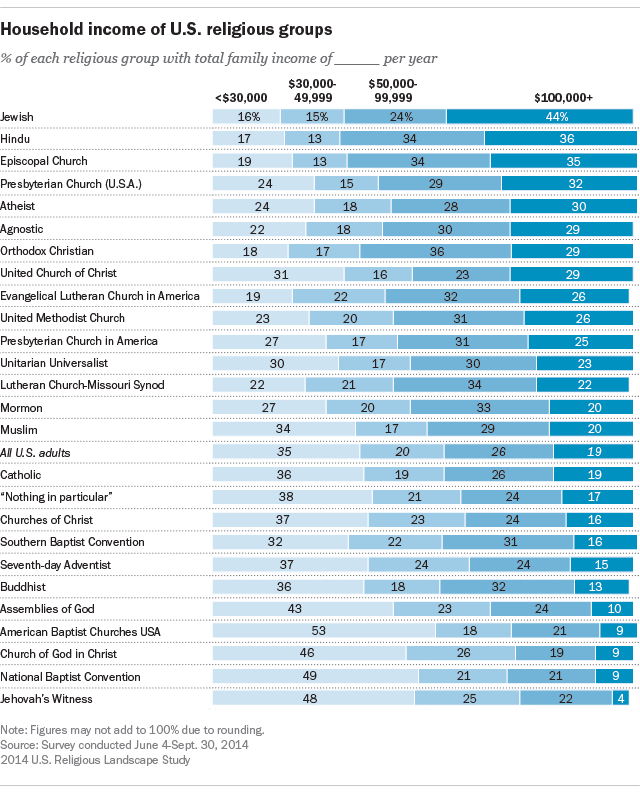Compared to Episcopalians and Presbyterians, Baptists store more of their treasure in heaven than on earth, according to a new comparison of household incomes of U.S. religious groups by the Pew Research Center.
The analysis of Pew’s 2014 Religious Landscape Study found highest incomes among Jewish and Hindu religions and the lowest for Jehovah’s Witnesses.
 Historically black denominations such as the National Baptist Convention and the Church of God in Christ rank near the bottom of the list with 9 percent of members earning $100,000 or more and nearly half less than $30,000.
Historically black denominations such as the National Baptist Convention and the Church of God in Christ rank near the bottom of the list with 9 percent of members earning $100,000 or more and nearly half less than $30,000.
More than half (53 percent) in American Baptist Churches USA, one of the most ethnically diverse religious bodies, have annual incomes below $30,000 while fewer than one in 10 (9 percent) pull down more than $100,000 a year.
Roughly a third (32 percent) of the Southern Baptist Convention earns $30,000 or more, ahead of Seventh-day Adventists, Buddhists and Assembly of God while behind the Churches of Christ, “nothing in particular” and Catholics. Nearly half of Southern Baptists (47 percent) have annual incomes of more than $50,000, including 16 percent in the $100,000-plus range.
Among all U.S. adults, 35 percent earn less than $30,000; 20 percent $30,000-$49,999; 26 percent $50,000-$99,999 and 19 percent $100,000 or more. Muslims and Mormons are a little better off, with 20 percent above the $100,000 range, behind Lutheran Church-Missouri Synod (22 percent), Unitarian Universalist (23 percent), Presbyterian Church in America (25 percent, United Methodist Church and Evangelical Lutheran Church in America (26 percent each) and the United Church of Christ (29 percent).
The wealthiest Christians are member of the Episcopal Church, with fewer than one in five earning below $30,000 and 35 percent above $100,000 a year. The Presbyterian Church (U.S.A.) ranks fourth, ahead of atheists, agnostics and Orthodox Christians.
The study correlates to earlier connections made between education and income, finding that the richest religious groups tend on average to also be better educated than most Americans. For instance, nearly half of Hindu adults and almost one-third of Jewish adults hold postgraduate degrees.
